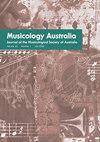Improvisation, Thang, and Thai Musical Structure
IF 0.3
0 MUSIC
引用次数: 4
Abstract
Despite its centrality to Thai musical thought and practice, Thai and English-language scholars have been reluctant to use the term ‘improvisation’ to describe Thai music. This reluctance stems from a number of interrelated factors, including the incommensurability of terms and concepts in the Thai and Western musical systems, scholars’ lack of familiarity with Thai and/or Western musical structure, and the improvisatory practices associated with them, especially jazz, which is thought to exemplify improvisation, and lack of clarity in understanding the Thai musical concepts of prae, plae, and thang that underpin Thai musical thought and provide the context in which improvisation can, and in some cases must, occur. By laying out some general principles associated with improvisation, especially Pressing’s concept of the ‘referent’, and describing how these relate to Thai musical structure, thought, and practice, we clarify uncertainty about Thai music’s structure and performance processes. We show that in learning to perform, Thai musicians develop intimate knowledge of their musical system and the stylistic qualities of all instruments. Their training teaches them to think in terms that mirror the logic of the musical system and enables them to improvise in stylistically appropriate ways.即兴,唐和泰国音乐结构
尽管它在泰国音乐思想和实践中处于中心地位,但泰国和英语学者一直不愿意使用“即兴”一词来描述泰国音乐。这种不情愿源于许多相互关联的因素,包括泰国和西方音乐系统中术语和概念的不可通约性,学者们对泰国和/或西方音乐结构以及与之相关的即兴实践缺乏熟悉,尤其是爵士乐,它被认为是即兴创作的典范,以及对泰国音乐概念prae, place,以及支撑泰国音乐思想的东西,并为即兴创作提供了环境,在某些情况下,即兴创作必须发生。通过列出一些与即兴创作相关的一般原则,特别是Pressing的“指涉”概念,并描述这些与泰国音乐结构,思想和实践的关系,我们澄清了泰国音乐结构和表演过程的不确定性。我们表明,在学习表演,泰国音乐家发展他们的音乐系统和所有乐器的风格品质的亲密知识。他们的训练教会他们用反映音乐系统逻辑的术语来思考,并使他们能够以风格适当的方式即兴创作。
本文章由计算机程序翻译,如有差异,请以英文原文为准。
求助全文
约1分钟内获得全文
求助全文

 求助内容:
求助内容: 应助结果提醒方式:
应助结果提醒方式:


